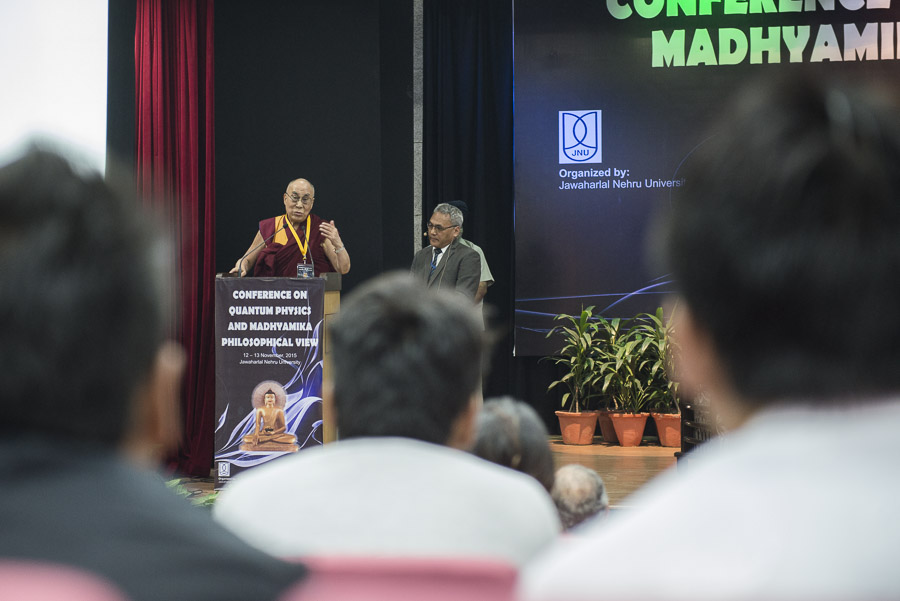
(TibetanReview.net, Nov14, 2015) – Tibet’s exiled spiritual leader, the Dalai Lama, took part in a Conference on Quantum Physics and Madhyamaka Philosophical View with the participation of experts in Quantum Physics and Tibetan Buddhists scholars in Madhyamaka Philosophy at the Jawaharlal Nehru University (JNU), Delhi, over Nov 12-13. Vice-Chancellor Prof SK Sopory presented to him a medallion bearing the University logo which represented international academic exchange and the search for knowledge for the betterment of human beings.
The Vice-Chancellor expressed gratitude to the Dalai Lama for suggesting the convening of the conference and choosing the JNU as the place to hold it.
Invited to address the conference after opening remarks by the Rector Prof Prasenjit Sen and the Vice-Chancellor, The Dalai Lama explained that while his scientific curiosity began when he was 19-20 years old, his dialogue with scientists began some 30 years ago. He said he began a series of dialogues focusing on cosmology, neurobiology, physics, including Quantum Physics, and psychology, adding they have been mutually beneficial. “Scientists have learned more about the mind and emotions, while we have gained a subtler explanation of matter. A casualty has been my belief in Mt Meru, described in ancient India as the axis of the universe,” he added.
The Dalai Lama went on to explain that some 15-20 years ago, the Indian physicist Raja Ramanna had told him at a meeting that the latter had been reading Nagarjuna, that he was amazed to find that much of what the ancient Indian Buddhist master had to say corresponded to what he had understood of quantum physics.
The Dalai Lama also recalled that a year ago at the Presidency College in Kolkata, the Vice-Chancellor Prof S Bhattacharya mentioned that according to quantum physics nothing exists objectively, which he said again struck him as corresponding to Chittamatrin (mind only) and Madhyamaka views, particularly Nagarjuna’s contention that things only exist by way of designation.
Among those who spoke on the conference’s first day was Prof Michel Bitbol, a French researcher into the philosophy of science. He said that one characteristic feature of quantum physics, ‘entanglement’ or ‘non-separability’, was reminiscent of the Buddhist concept of dependent arising. Just as the ancient texts warn that explanations of emptiness can shock the unprepared, Bitbol quoted Niels Bohr as saying that those not shocked by quantum theory have not understood it.
Others who spoke included Prof N Mukunda, who chaired the first session, Geshe Ngawang Samten who chaired the second session, Geshe Ngawang Sangye of Drepung Loseling Monastic University (who spoke on ‘Concerning the Chittamatrin View of Emptiness’), Prof Rajaram Nityananda who chaired the fist afternoon session, Prof Matthew Chandrankunnel (who spoke on ‘The Ontology and Epistemology of Reality According to Quantum Mechanics and Madhyamaka Buddhism’), Geshe Lobsang Tenpe Gyaltsen (on ‘The Buddhist Perspective on the World and its Beings’) and Geshe Chisa Drungchen Tulku (on ‘The Two Truths: a Prasangika Madhyamaka Perspective).
The conference resumed on the second day, on Nov 13, after an initial remark by the Dalai Lama. Papers were presented by Prof Sundar Sarukkai (on wave-particle duality in relation to Nagarjuna’s ‘Fundamental Treatise on the Middle Way’), Geshe Jangchub Sangay of Gaden Monastic University (on dependent arising), a mathematician and swami Mahan Maharaj (on Algebra-Geometry Duality), and Prof Arthur Zajonc (on Experimental Foundations of Quantum Physics).
Before the second day’s conference began, the Dalai Lama was invited to release two books. One was a compilation of tributes and recollections about Mr AP Venkateswaran, former Indian Foreign Secretary who passed away last year. The second book, ‘Changes on the Roof of the World—reflections on Tibet’, was a compilation of research by Tibetan PhD candidates of JNU.
During his concluding remarks the Dalai Lama suggested that next year the JNU convene a conference to focus on the mind and emotions involving neurobiologists and brain specialists.


